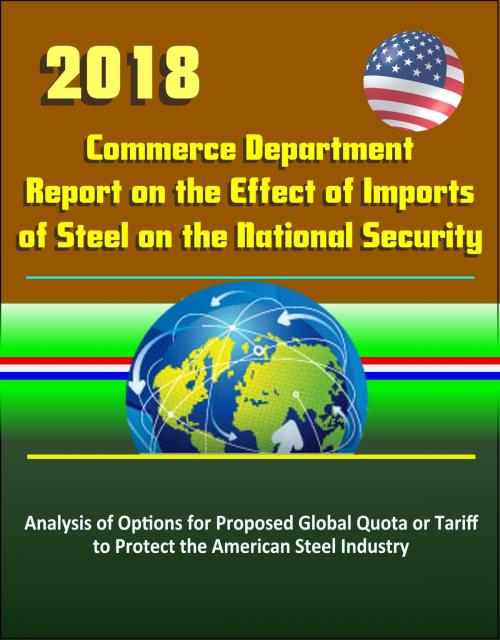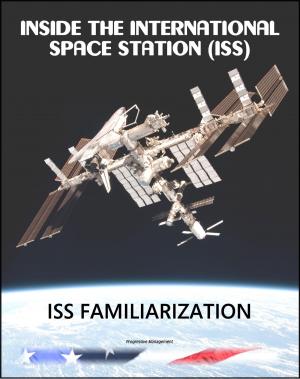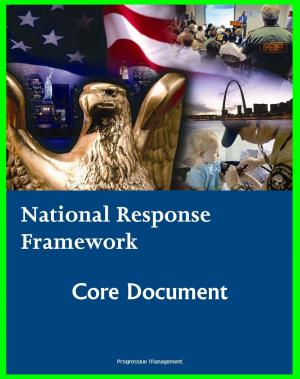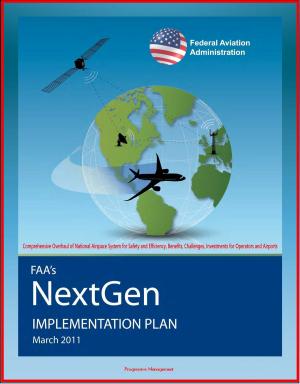2018 Commerce Department Report on the Effect of Imports of Steel on the National Security: Analysis of Options for Proposed Global Quota or Tariff to Protect the American Steel Industry
Nonfiction, History, Military, Weapons, Business & Finance, Industries & Professions, Industries| Author: | Progressive Management | ISBN: | 9781370605484 |
| Publisher: | Progressive Management | Publication: | February 23, 2018 |
| Imprint: | Smashwords Edition | Language: | English |
| Author: | Progressive Management |
| ISBN: | 9781370605484 |
| Publisher: | Progressive Management |
| Publication: | February 23, 2018 |
| Imprint: | Smashwords Edition |
| Language: | English |
Professionally converted for accurate flowing-text e-book format reproduction, this unique book presents the official report on the U.S. Department of Commerce’s investigations into the impact on our national security from imports of steel mill products. This investigation was carried out under Section 232 of the Trade Expansion Act of 1962, as amended. “I am glad that we were able to provide this analysis and these recommendations to the President,” said Commerce Secretary Wilbur Ross. “I look forward to his decision on any potential course of action.” The Department of Commerce found that the quantities and circumstances of steel and aluminum imports “threaten to impair the national security,” as defined by Section 232.
The reports are currently under consideration by the President, and no final decisions have been made with regard to their contents. The President may take a range of actions, or no action, based on the analysis and recommendations provided in the reports. Action could include making modifications to the courses of action proposed, such as adjusting percentages.
The President is required to make a decision on the steel recommendations by April 11, 2018, and on the aluminum recommendations by April 19, 2018.
Key findings of the steel report: The United States is the world’s largest importer of steel. Our imports are nearly four times our exports. Six basic oxygen furnaces and four electric furnaces have closed since 2000 and employment has dropped by 35% since 1998. World steelmaking capacity is 2.4 billion metric tons, up 127% from 2000, while steel demand grew at a slower rate. The recent global excess capacity is 700 million tons, almost 7 times the annual total of U.S. steel consumption. China is by far the largest producer and exporter of steel, and the largest source of excess steel capacity. Their excess capacity alone exceeds the total U.S. steel-making capacity. On an average month, China produces nearly as much steel as the U.S. does in a year. For certain types of steel, such as for electrical transformers, only one U.S. producer remains. As of February 15, 2018, the U.S. had 169 antidumping and countervailing duty orders in place on steel, of which 29 are against China, and there are 25 ongoing investigations.
Secretary Ross has recommended to the President that he consider the following alternative remedies to address the problem of steel imports: A global tariff of at least 24% on all steel imports from all countries, or, a tariff of at least 53% on all steel imports from 12 countries (Brazil, China, Costa Rica, Egypt, India, Malaysia, Republic of Korea, Russia, South Africa, Thailand, Turkey and Vietnam) with a quota by product on steel imports from all other countries equal to 100% of their 2017 exports to the United States, or a quota on all steel products from all countries equal to 63% of each country’s 2017 exports to the United States.
Each of these remedies is intended to increase domestic steel production from its present 73% of capacity to approximately an 80% operating rate, the minimum rate needed for the long-term viability of the industry. Each remedy applies measures to all countries and all steel products to prevent circumvention.
Professionally converted for accurate flowing-text e-book format reproduction, this unique book presents the official report on the U.S. Department of Commerce’s investigations into the impact on our national security from imports of steel mill products. This investigation was carried out under Section 232 of the Trade Expansion Act of 1962, as amended. “I am glad that we were able to provide this analysis and these recommendations to the President,” said Commerce Secretary Wilbur Ross. “I look forward to his decision on any potential course of action.” The Department of Commerce found that the quantities and circumstances of steel and aluminum imports “threaten to impair the national security,” as defined by Section 232.
The reports are currently under consideration by the President, and no final decisions have been made with regard to their contents. The President may take a range of actions, or no action, based on the analysis and recommendations provided in the reports. Action could include making modifications to the courses of action proposed, such as adjusting percentages.
The President is required to make a decision on the steel recommendations by April 11, 2018, and on the aluminum recommendations by April 19, 2018.
Key findings of the steel report: The United States is the world’s largest importer of steel. Our imports are nearly four times our exports. Six basic oxygen furnaces and four electric furnaces have closed since 2000 and employment has dropped by 35% since 1998. World steelmaking capacity is 2.4 billion metric tons, up 127% from 2000, while steel demand grew at a slower rate. The recent global excess capacity is 700 million tons, almost 7 times the annual total of U.S. steel consumption. China is by far the largest producer and exporter of steel, and the largest source of excess steel capacity. Their excess capacity alone exceeds the total U.S. steel-making capacity. On an average month, China produces nearly as much steel as the U.S. does in a year. For certain types of steel, such as for electrical transformers, only one U.S. producer remains. As of February 15, 2018, the U.S. had 169 antidumping and countervailing duty orders in place on steel, of which 29 are against China, and there are 25 ongoing investigations.
Secretary Ross has recommended to the President that he consider the following alternative remedies to address the problem of steel imports: A global tariff of at least 24% on all steel imports from all countries, or, a tariff of at least 53% on all steel imports from 12 countries (Brazil, China, Costa Rica, Egypt, India, Malaysia, Republic of Korea, Russia, South Africa, Thailand, Turkey and Vietnam) with a quota by product on steel imports from all other countries equal to 100% of their 2017 exports to the United States, or a quota on all steel products from all countries equal to 63% of each country’s 2017 exports to the United States.
Each of these remedies is intended to increase domestic steel production from its present 73% of capacity to approximately an 80% operating rate, the minimum rate needed for the long-term viability of the industry. Each remedy applies measures to all countries and all steel products to prevent circumvention.















